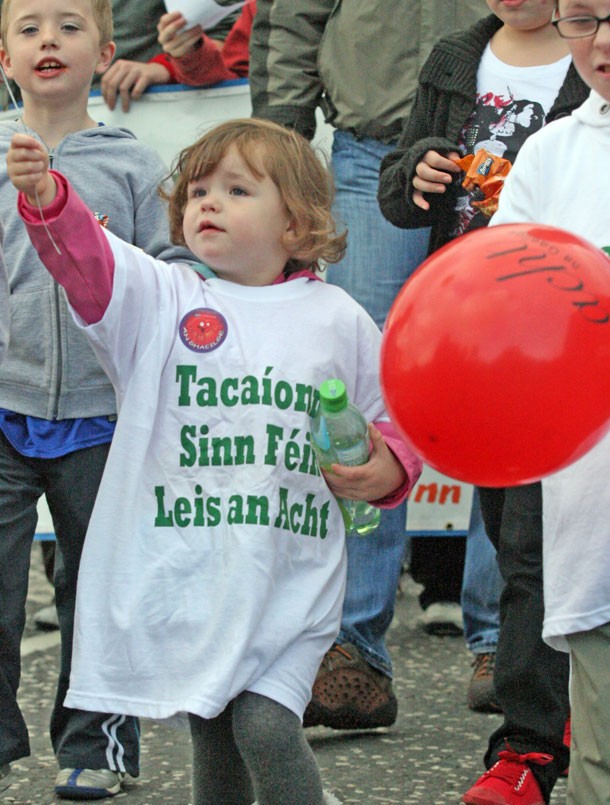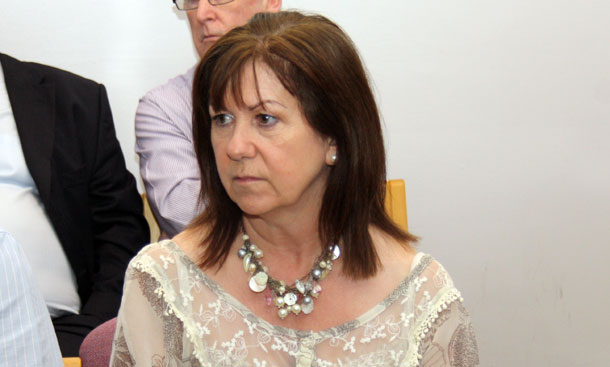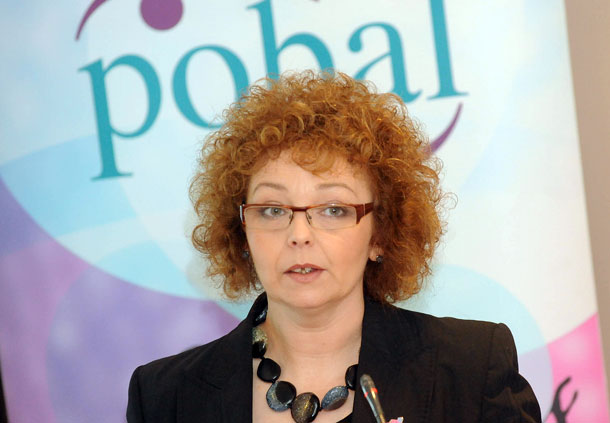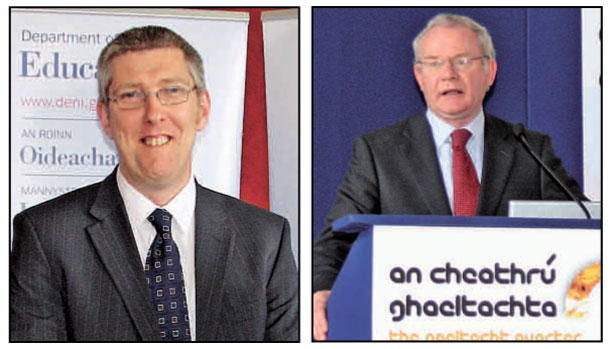29 April 2014 Edition
Fighting for an Ghaeilge at every level

• In the North, the British Government and the unionist parties refuse to legislate for Acht na Gaeilge
‘Sinn Féin welcomes the new arrangements because they bring clarity, certainty, stability and cohesion to the promotion of the Irish language throughout the 32 Counties’
West Belfast MLA Rosie McCorley explains why Sinn Féin is backing Foras na Gaeilge proposals
AS the debate around the place of the Irish language in society intensifies across the country, it is clear that more and more people are recognising the value of an Ghaeilge to the well-being of the nation.
More and more people accept that the language will prosper if it is promoted as a central plank of our heritage and culture.
The popular support for the language (seen when a reported 10,000 people marched in February in the capital for Lá Mór na Gaeilge) isn’t matched by officialdom.
In the North, the British Government and the unionist parties refuse to legislate for Acht na Gaeilge; while in the South, despite its status as the ‘official’ language, Irish is tolerated as another box to be ticked, irrelevant to people as part of their national identity.
In the face of this ‘official’ cynicism and the apathy engendered by it, the work of language groups, of teachers and many thousands of enthusiasts is bearing fruit. Slowly but surely, they are bringing Irish centre stage.
One of the big actors in this drama, Foras na Gaeilge, published its proposals for the development of the language in January 2014. One was the reorganisation of funding for Irish-language groups with the proposed structures, reducing the number of core-funded organisations from 19 to 6.
Needless to say, the Foras proposals have generated much debate, especially as none of the groups nominated for core funding is based in the North.
It is no surprise that the immediate reaction of some Northern Gaeilgeoirí to the planned shake up has been negative.

• Rosie McCorley
Speaking to An Phoblacht, West Belfast MLA Rosie McCorley outlined Sinn Féin’s thinking and strategy around the language and explained why the party is backing the Foras proposals.
McCorley welcomed the announcement, describing it as “an important landmark in all-Ireland language development”.
She added:
“Sinn Féin welcomes the new arrangements because they bring clarity, certainty, stability and cohesion to the promotion of the Irish language throughout the 32 Counties.
“The previous arrangement with 19 core funded organisations was wasteful, involving much overlapping and lack of cohesion with some operating in one jurisdiction only.
“The new arrangements, with six lead organisations, will contribute greatly to the effective implementation of the language strategies North and South.”
She also pointed out that, while none of the six lead organisations is based in the North, at least 25% of the services will be provided in the North.
“My own preference is that those language activists who have been delivering excellent services over the years will continue to do so under the new arrangements.
“However, Foras funds will continue to go to projects like An Chultúrlann, An Droichead, Glór na Móna, Raidió Fáilte, An tÁisaonad, Croí Éanna, Skainos, the McCracken Cultural Society, the Ivy Centre and others besides.”
Rosie McCorley went on to explain that Foras na Gaeilge, which was set up under the Good Friday Agreement, has responsibility for the Irish language throughout the 32 Counties and as such it is the most powerful tool available to Irish-language activists and official agencies alike, notwithstanding the difficulties that have been experienced by groups under Foras.
She pointed out that, as far back as 2008, Foras recognised the need to review the structures of the core-funded Irish-language organisations.
“As a result an external review (the Mazars Report) was carried out and, following an Equality Impact Assessment, the North/South Ministerial Council agreed to changes in the system of core funding.
“These changes are aimed at getting value for money and effective delivery of services and obligations and involved the introduction of six distinct areas of work.”
She outlined these areas of activity as:-
- Irish-medium/immersion education and Irish-medium pre-school education;
- Awareness raising, language protection and representation;
- Education in the English-language sector and for adults, and opportunities for school pupils to use the language;
- Opportunities which support the use of Irish and the establishment of networks;
- Community and economic development;
- Development of opportunities for use of Irish and of networks for young people.
Answering those critics who say the North may lose out due to the new arrangements, McCorley said although there will be fewer organisations being funded under the new model the opportunities brought about for sharing expertise are exciting.
“The percentage of core-funded employment in the Six Counties will increase slightly and if the six new core-funded lead organisations are maximised to their full potential there should be a significant increase in Irish-language sector employment in the Six Counties.
“The Foras outlook envisages the national language movement and local initiatives working in tandem so there is no need for concern that the North’s needs would not be catered for and that these particular needs will be included in work programmes and job distribution.”
The West Belfast MLA reiterated the party’s backing for those groups and organisations whose work ‘on the ground’ has been pivotal to the language’s growth.
“We will support and accommodate local language groups seeking to develop and grow.
“The Irish language recognises no borders and we will be working towards 32-County language harmony within a set timescale.”

• Carál Ní Chuilín
Rosie McCorley was also keen to point out that Sinn Féin’s Executive Ministers Carál Ní Chuilín in the Department of Culture, Arts and Leisure (DCAL) and John O’Dowd in Education have been putting their shoulders to the wheel when it come to promoting the Irish language.
DCAL’s Líofa initiative has, so far, signed 5,000 people up to be fluent in Irish by 2015.
“We want the Líofa initiative to be taken up by the Minister of State for the Gaeltacht in the South,” McCorley said.
“DCAL has also provided bursaries to the less-well-off and those on benefits, enabling them to go on intensive residential Irish courses in the Gaeltacht,” she added.
Sinn Féin, McCorley stressed, also argued for the establishment of the Irish Language Broadcast Fund to finance high-quality programming and develop an independent Irish-speaking production sector in the North. Training is an important element of this work. The party negotiated a further £12million for the fund in 2010. A minimum of 70% of production costs is spent in the North, thus boosting local employment.
And at the Hillsborough talks in 2010, Gerry Adams secured £8million funding for Ciste Infheistíochta Gaeilge (CIG.) This is being used to build the physical infrastructure required to meet the needs of the burgeoning Irish-language community in the North.

The six areas of work paired with the relevant lead organisation are . . .
Irish-medium education: Gaelscoileanna Teo
Irish in English-medium education: Gael-Linn
Language-centred community and economic development: Glór na nGael
Language use: Oireachtas na Gaeilge
Language awareness: Conradh na Gaeilge
Youth networks: Cumann na bhFiann
Sinn Féin, the Department of Education and the Irish language
IN 1999, in one of his first acts as Minister for Education, Martin McGuinness established the advisory body Comhairle na Gaelscolaíochta and Iontaobhas na Gaelscolaíochta with an investment fund of £2million for capital investment in Irish-medium schools.
He awarded full-time statutory status to Naíscoil Bhreandáin and Bunscoil an tSléibhe Dhuibh, in Belfast, and established an investment of £2million in classroom resources for all levels of Irish-medium education.
He also signed off on Irish-medium pre-school provision in eight areas and approved of Irish-medium education in six new areas, including Glengormley, Crumlin and Magherafelt.
McGuinness also approved post-primary provision in Armagh and Tyrone.
But it was at the level of training where he increased curricular support for Irish teachers and staff throughout the Education and Library Boards and the Regional Training Unit that Sinn Féin made a structural impact on Irish-medium education.
McGuinness adopted all the recommendations of The Review of Irish-Medium Education (IME) resulting in:
- The Literacy and Numeracy Strategy for IME;
- Revised curriculum for IME;
- Diagnostic testing for children in IME;
- Phonic reading support for children in IME;
- Irish-language training for teachers and classroom assistants in IME.
He also increased the number of teacher training places in IME and invested between £25million and £30million in capital investment in either building new schools or improving existing ones.
Coláiste Feirste in Belfast, which Gerry Adams championed since it was founded in 1991, has received something in the region of £18million in recent years.
When Martin McGuinness first took on the Education brief there were 1,461 pupils in 18 Irish-medium schools; today there are 4,627 pupils in 67 schools or units.

• Education Minister John O’Dowd MLA and Joint First Minister Martin McGuinness
There are now 24 stand-alone government-funded schools in the North, plus a further 13 units attached to English-medium schools.
Education Minister John O’Dowd funds Comhairle na Gaelscolaíochta to the tune of £839,000.
The Department of Education spends £16.25million on Irish-medium education plus an unprecedented £20million capital investment in Irish-language schools.
Rosie McCorley pointed out:
“It was Sinn Féin who brought Irish-language equality issues into the Good Friday Agreement negotiations, which is why we took on the Education and DCAL (Department of Culture, Arts and Leisure) briefs in the Executive.
“Equally, it was Sinn Féin who proposed the establishment of the all-Ireland body for the Irish-language Foras na Gaeilge and we negotiated its responsibilities, membership, structure and budget.
“Though we won the argument for an Irish Language Act in the North during the St Andrews talks, British and Irish unionism have been blocking it since, but we are as determined as ever to bring Acht na Gaeilge into law and we won’t stop until the legislation is in place.”




